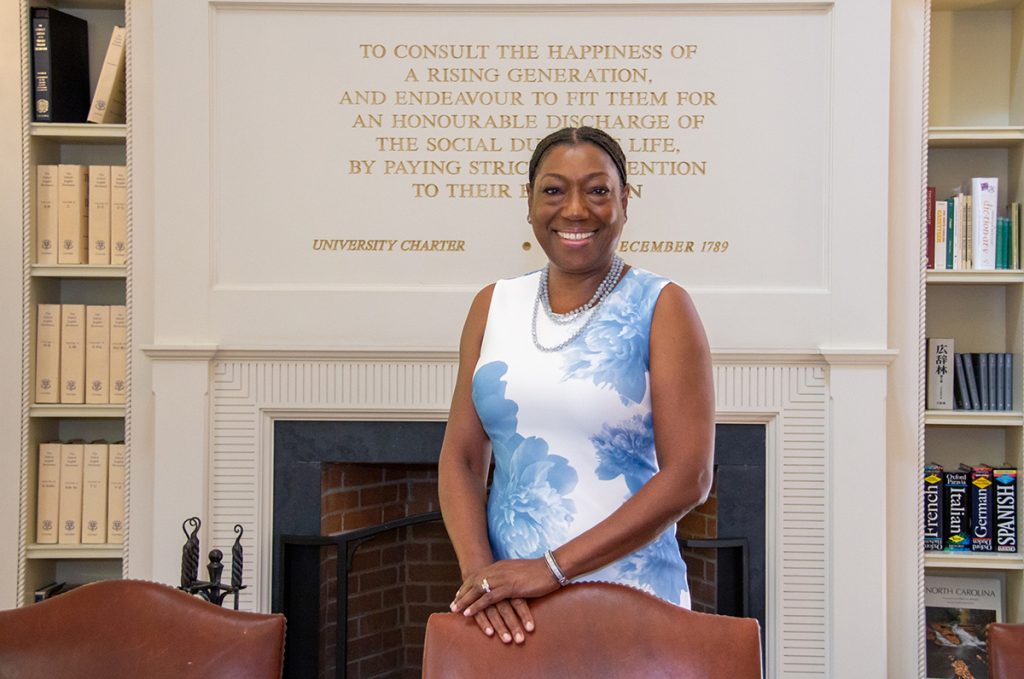Winner Patricia Parker accepted in honor of a woman Thomas Jefferson enslaved and Ella Baker, a civil rights leader.

Two weeks before Patricia Parker received the 2023 Thomas Jefferson Award — one of Carolina’s highest faculty honors – at the Oct. 6 Faculty Council meeting, she toured Jefferson’s estate in Virginia.
Parker, who is the Ruel W. Tyson Jr. Distinguished Professor and director of the Institute for the Arts and Humanities in UNC’s College of Arts and Sciences, visited Monticello to take the 2.5-hour “From Slavery to Freedom” tour.
As a Black woman and a descendant of enslaved ancestors, Parker wanted a glimpse of what life was like for the nearly 400 Black men, women and children Jefferson enslaved there, including Sally Hemings, the mother of four Jefferson children.
Still thinking of the enslaved woman when she returned to Chapel Hill, Parker accepted the Jefferson Award in honor of Hemings and of civil rights trailblazer Ella Baker. As she has on many occasions in her 25 years at Carolina, Parker used this opportunity to talk about reckoning.
“This award is significant to me because it provides a platform for elevating what I think is among the most sacred and urgent work at UNC-Chapel Hill — reckoning with the legacies of systemic racism at the founding of the United States and this university to find pathways toward healing, reparations and strengthening American democracy,” Parker said.
Parker has long been influenced by the leadership of Baker, a North Carolinian and early architect of the civil rights movement who used a grassroots approach to empower people. Throughout her academic career, Parker has studied and written books about the late Baker’s method of “servant leadership,” and founded the Ella Baker Women’s Center for Leadership and Community Activism in 2007.
Parker emulated Baker through many leadership roles, including chair of the College of Arts and Sciences’ communication department from 2015 to 2021. She was the College’s first director of faculty diversity initiatives, setting up diversity liaisons for every department and creating a network of faculty leaders working toward a fairer, more inclusive environment.
Parker also co-chairs the University Commission on History, Race and a Way Forward, which hosted the Spring 2023 Universities Studying Slavery Conference in March.
Jefferson’s legacy
Faculty annually give the Jefferson Award, established in 1961 by the Robert Earll McConnell Foundation, to “that member of the academic community who … has best exemplified the ideals and objectives of Thomas Jefferson,” whose complex legacy includes the values of democracy, public service and the pursuit of knowledge.
Jefferson’s legacy also includes racist views that are at odds with the Declaration of Independence he authored. History professor Lloyd Kramer, the 2021 recipient of the award, addressed those contradictions in his acceptance speech, saying, “We have to think with Jefferson’s other ideas while we also think against his racism.”
Fittingly, Kramer is the faculty member who nominated Parker for this year’s Jefferson Award.
“I believe that Pat’s career has tried to build on the positive aspects of the Jeffersonian ideas — human rights, democracy, public education — while also challenging the negative legacies of racism and hierarchy that flowed from the slave system that supported Jefferson’s privileged social life,” Kramer said. “Just as our own university has a complex history of racism and slavery that we are reckoning with, so does the Monticello Jeffersonian tradition, and I couldn’t think of anyone better positioned to wrestle with that challenge.”
In her acceptance speech, Parker said that since Jefferson, intentionally or not, left unfinished business for future generations to pursue, “we are the ones that must believe in our democracy.”
“I think the ideals the award represents are absolutely an affirmation of my life’s work,” Parker said. “It’s a reckoning with Thomas Jefferson’s legacy and, in a way, it’s symbolic of my being here at the University of North Carolina in the first place.”
By Michael Lananna, University Communications
